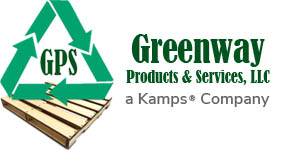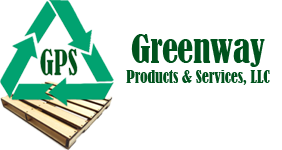Anyone who regularly interacts with wooden shipping pallets – whether as a buyer who needs a regular supply of pallets to transport products, as a business owner whose employees are going to be loading and unloading goods from pallets on a frequent basis, or as a DIY hobbyist looking for pallet lumber as a source of raw crafting materials – should be familiar with the symbols and abbreviations stamped onto many of the wood pallets currently in circulation. These stamps, painted or branded onto the wood, provide important information about where the individual pallet came from and the kinds of treatment the lumber has undergone.
If you don’t see any sort of stamp, mark, or brand on a pallet, that means it hasn’t been certified for use across national borders, and can only be used to transport goods domestically within the boundaries of the country. If you’re in the US, these “national pallets” are most likely safe and reliable, but if you intend to use the pallets for sensitive applications like carrying food or as raw materials for indoor DIY projects, it may be better to err on the side of caution and choose a pallet whose provenance you can trace.
The WPM (Wood Packaging Material) stamp on pallets intended for international use contains several important pieces of information. It contains the IPPC (International Plant Protection Convention) logo on the left side; the IPPC is a treaty that aims to prevent the spread of pests that affect plant life across international borders. The right side contains a number of abbreviations and codes with information about the origins and treatment of the pallet. The presence of a WPM stamp on two opposite sides of a pallet guarantees that the lumber used to construct the pallet has been treated with phytosanitary measures to neutralize plant pests.
The top line of information consists of a two-letter country code, followed by a regional identifier and registration number that further elaborates on the pallet’s origin. Below that line is a series of abbreviations indicating what type of phytosanitary procedures the lumber was treated with to ensure that it carries no pests. Codes that you may find in this section include:
- DB: Debarking. This indicates that the layer of bark (the rough exterior portion of a tree) has been cut or planed away from the lumber beneath. This is an important step, as it allows for a more thorough treatment of the lumber, and because the outer bark layers are often home to a variety of plant pests. Newer pallets may not bear this stamp, because most modern forms of phytosanitary treatment require debarking as a necessary step, and therefore lumber that has undergone one of these treatments is assumed to have been debarked. Thus, IPPC regulations no longer require this stamp.
- HT: Heat treatment. This stamp certifies that the lumber in the pallet has undergone a phytosanitary treatment process in which the wood was heated in a kiln to a minimum core temperature of 56 degrees Celsius (for softwoods) or 60 degrees Celsius (for hardwoods) and maintained at that temperature for at least 30 minutes.
- KD: Kiln dried. The process of kiln drying also involves heating the wood in a kiln, but the purpose of this heating is to reduce the moisture content of the wood, and it does not reach the sustained high temperatures necessary to neutralize plant pests. However, many lumber mills process their timber in such a way as to meet both sets of requirements, meaning that you may encounter pallets bearing both KD and HT stamps.
- DH: Dielectric heating. This relatively recently-adopted method of heat treatment was approved by the IPPC in 2013. It uses electromagnetic radiation, usually either microwaves or radio waves, to penetrate the lumber and heat it consistently throughout. This phytosanitary method can be used on used, repaired, and remanufactured wood pallets as well as on new lumber.
- MB: Methyl bromide fumigation. This symbol indicates that the lumber used to construct the pallet was chemically treated with methyl bromide, a potent pesticide. Though effective against invasive pest species like the pine beetle, methyl bromide is linked to both a variety of human health problems and to the depletion of the planet’s ozone layer. As such, the Commission on Phytosanitary Measures adopted a recommendation in 2008 to reduce or replace the use of methyl bromide as a phytosanitary treatment. This chemical treatment is now banned in many countries, but some parts of the world (including Asia and Oceania) still use it to prevent the spread of plant pests.
There are a few other abbreviations or symbols you may encounter near or alongside the WPM stamp that provide additional information. These include:
- PRL: Indicates that the lumber making up the pallet was verified by the Package Research Laboratory, the largest IPPC inspection agency in the US.
- EPAL: Indicates a European pallet, inspected and verified by the European Pallet Association, which does not permit methyl bromide treatment.
- EUR: An older version of the European Pallet Association, no longer in current use, and not a reliable indicator of the absence of chemical pesticide treatments.
Whether you’re in need of pallets to transport merchandise for your business, to store and display goods in a shop, or to repurpose as crafting materials at home, understanding the WPM stamp codes on the sides of your pallets will help you make safe and informed decisions about pallet selection.
About Greenway Products & Services
Greenway Products & Services is a pallet manufacturer and re-manufacturer as well as a full-service pallet management company servicing Maryland, Delaware, New Jersey, New York, and Eastern Pennsylvania. Greenway’s product line includes new, reconditioned/recycled, remanufactured, wood and plastic pallets in standard and custom sizes for domestic and international shipping. Greenway is one of the mid-Atlantic suppliers of heat-treated pallets. The company offers comprehensive pallet services, including pallet delivery, storage, removal and disposal, repair programs, ISPM 15 services, consulting services, excess pallet purchase program, drop trailer services, and trucking services. Greenway is part of the Kamps, Inc. family of companies.



Leave A Comment